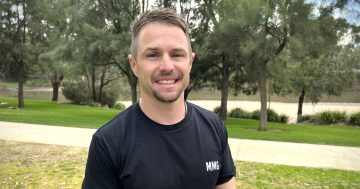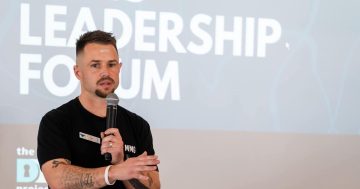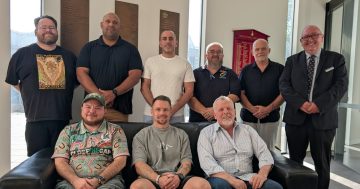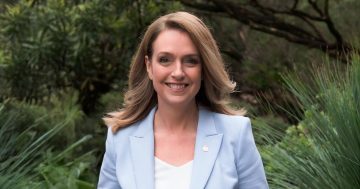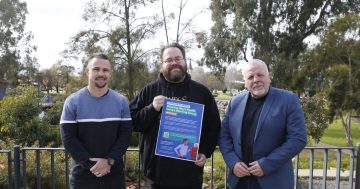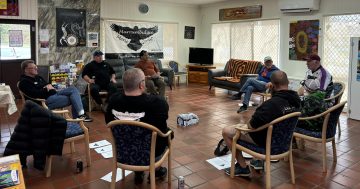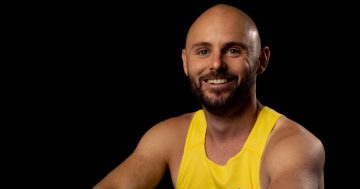
Wagga Wagga Men’s Shed members’ projects have included taking apart an old washing machine and extracting materials for reuse (left), and building a toilet from old washing machine parts. Photos: Wagga Wagga Men’s Shed.
WARNING: This article discusses suicide and mental health issues.
As we approach Men’s Mental Health Week next month, a Men’s Shed leader has urged government to do more about “men sitting around doing nothing”.
Wagga Men’s Shed secretary David Croft has found that keeping men active helps their mental health and builds camaraderie. The Shed is an eclectic group, with the youngest member being 18 and the oldest seeing his 102nd birthday soon.
“Our motto is ‘Shoulder to shoulder, not face-to-face’,” Mr Croft said. “We try and minimise any disputes, arguments or anything like that. And everybody is equal.”
The men at the Shed are doing well, but Mr Croft thinks the government should look at those falling between the cracks — the men he describes as “sitting at home doing nothing” with “a bag of chips and a can of Coke”.
“The men come, they’re socially interactive, and if they need some support, they’re not frightened to put their hand up and ask for it,” he said.
“Whereas there’s so many men that are sitting at home that don’t have that interaction, and that’s where your government funding probably needs to really look at.”
The Minns Labor Government will invest nearly $1.4 million in the Men’s Mental Health and Suicide Prevention Small Grants Program, an increase on the initial $400,000 announced.
The Australian Men’s Shed Association will receive a portion of the grant.
Mr Croft thinks that any grant will be helpful.
“A little bit is better than nothing,” he said.
The Men’s Shed does a great deal of fundraising to support its activities, so any support from the government is welcome. Funds are raised through garage sales, woodworking and other activities designed to keep members an active part of the community, with excess funds going to local charities.
“[We’re] not getting much from the government,” Mr Croft said.
“We’re always fighting for a bit more funding, but we’re resigned to the fact possibly we’re not going to get a lot from the government.”
The founder of Murrumbidgee Men’s Group Rhys Cummins called the program a “step in the right direction”.
“The more funding, the better, and particularly around, you know, like the grassroots organisations that are on the ground, they’re seeing exactly what’s happening and they’ve already got that rapport with the community,” Mr Cummins said.
“So I feel like, yeah, funding into the grassroots sector is extremely important and a really positive step.”
Mr Cummins founded the group to encourage men to seek help for their mental health, something that he struggled with and led him to attempt suicide in 2018.
“It can be extremely difficult, as a bloke, to kind of pinpoint, you know, what’s actually going on for us in regards to our emotions and what we’re feeling,” he said.
“I feel like women do a much better job of emotional regulation than men. And sometimes [men] really struggle with our emotions, and that’s just due to social conditioning.”
Minister for Mental Health Rose Jackson hopes the funding boost will address the “deeply concerning” suicide rates among men.
“Men are disproportionately impacted by suicide and account for more than three-quarters of suicide deaths in NSW,” she said, quoting statistics from the NSW Suicide Monitoring System.
“This is deeply concerning, and we are continuing to engage with men and men’s mental health experts to see how we can bring these rates down.
“I think more funding in our community is a huge step in the right direction. We just need to make sure it gets to the right places. And I think that the grassroots organisations, the organisations that have already built that rapport with the community, are extremely important.
“Community mental health care is fundamental as we work to address the drivers of distress and provide local solutions for at-risk men across NSW, making sure they can reach out for help when needed.”
If you are contemplating suicide, or someone you know is, you can contact:
Lifeline: 13 11 14
13 YARN: 13 92 76
Beyond Blue: 1300 224 636
Suicide Call Back Service: 1300 659 467
NSW Mental Health Line: 1800 011 511.
More information can be found here.







